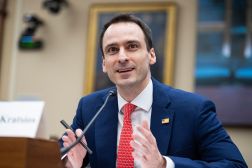Obama’s biggest achievement in tech? Getting nerds into the room, DJ Patil says


Courtesy DJ Patil, LinkedIn
Technologists were welcomed into the highest echelons of government during President Obama’s eight years in office — a shift that allowed the White House to discuss the nation’s biggest problems in completely novel ways, says the administration’s chief data scientist.
“People look around the room and it’s that moment where somebody says, ‘who here is the technologist?’” said U.S. Chief Data Scientist DJ Patil in an interview with FedScoop. “And this is happening in the Oval [Office], this is happening in the Roosevelt Room, this is happening in some small room totally off-campus in some other agency.”
While the administration was able to celebrate several tangible projects that incorporate technology or data in big ways — the Precision Medicine Initiative, Data.gov, Code.gov and others — Patil says Obama’s presidency is just as noteworthy for a shift that nobody saw. Great tech minds are now at the proverbial table in federal government, he says, citing the presence of techies like adviser Ed Felten and the creation of groups like the U.S. Digital Service.
Patil’s most important takeaway from his time in government? When there’s a technologist at the table, “suddenly you get a much different approach of potential ideas,” says Patil, the first person to hold the U.S. chief data scientist title.
As an example, Patil noted Defense Secretary Ash Carter’s Hack the Pentagon program. It happened not only because Carter is interested in technology, but also “he has people like the Defense Digital Service right there, down from his office.” Carter established DDS to improve the Pentagon’s tech capabilities.
Patil noted that Carter — and even Obama — are in regular touch with the data science team.
“The president calls us all the time, like ‘there’s an issue. What’s your thoughts?’” Patil said. “That’s a difference.” Obama, Patil said, looks to data and technology in general to support real-world problems — on everything from delivering better health care to improving policing.
When asked about how to make the administration’s gains in technology and data stick, Patil pointed to his “data cabinet” — a group of chief data officers and data leaders in agencies that meets once a month to discuss ways to better use data. More than 24 agencies have some type of chief data official, Patil noted.
“That’s kind of the part that also gives me the biggest hope, is like, those aren’t politicals,” Patil said of the data cabinet. “Those are all career people.”
Patil himself is a political appointee who is unlikely to stick around for Donald Trump’s administration. FedScoop talked to Patil at Amazon Web Services’s re: Invent conference about everything from Obama’s technology legacy, to what he sees ahead in the federal data landscape. Here’s what he said:
Obama’s approach: ‘We design with you’
“I think the reason this president has been so singularly effective is because he’s seen in every single thing, from the beginning of his campaign, how data and technology have transformed and been literally a force multiplier,” Patil said. “You’re on the campaign trail. How do you get the word out more effectively, how do you talk to people, how do you communicate? Data. Technology. Things that now are taken for granted.”
He added: “In every policy decision or discussion, you just see data and technology just continues to compound.”
Patil said Obama’s own way of approaching problems led to a people-centric approach to using technology to solve problems. That “design thinking” influenced some of the president’s major initiatives, like the Precision Medicine Initiative, a push to use patients’ genetic, environmental and lifestyle data to find better ways to treat illnesses, Patil said. The president reminded everyone that patients would always be “directly” at the table, Patil said, not just an advocacy group.
“That has been a game-changer that I think is going to be forever changing the way federal government happens,” Patil said. “And that comes singularly from the president.”
Instead of government saying it will design for the citizen, Patil said the president’s approach emphasizes designing with the citizen. Patil thinks that mindset comes from Obama’s time as a community organizer.
“The most stunning thing to me has always been, and I still don’t understand this is, how does a congressional law scholar get this form of design thinking?” Patil said of Obama. “Where the first question he asks is like, so how are you going to make sure that real humans are around the table at this?”
Examples from the field: AI policy and Data.gov
When discussing how artificial intelligence would impact the country, Obama’s first question was: “What’s it going to mean with autonomous vehicles for the trucking industry? What’s it going to mean for these other jobs?” Patil said.
“That, I think, is deeply, deeply profound given the complexity of the space, and being able to reduce it most to what is important for people,” Patil said.
The administration made an effort explore the implications of artificial intelligence through workshops and requests for information from the community, which coalesced in a report and a “high-level framework” of goals for the executive branch related to research and development of AI.
But getting to that people-centered approach is not always easy, and Patil said one of the administration’s initiatives in particular is still struggling to establish a good feedback loop. Data.gov launched in 2009 as the government’s first data catalogue, and while the site has seen the opening of many government datasets, it has also been subject to some criticism for its usability and success at reaching intended audiences.
Patil noted that from the site’s launch, government staff had been trying to figure out how to create a good user feedback model.
“No one’s figured out a good way to make that scalable on a website,” Patil said. “And so there’s versions of it that we’ve tried over time and that’s going to have to continue to iterate and try.”
Patil said another issue in the website’s future is figuring out who stores the data.
“There’s a lot of really great datasets, particularly in sciences, where people say ‘Hey, I’m out of funding, or these computers are getting old, where do I put this data?’” Patil said. “Where is that supposed to go, how are we supposed to think about that? That’s another turn that the teams are going to have to think about in the next iteration.”
But he did note that the site has been extremely effective in giving cities a model for opening data.
“You have cities who have said, ‘Oh that’s Data.gov. Well let’s take that idea of Data.gov and let’s make it ours,’” Patil said.
Cities and states: ‘Zika doesn’t care that the city line is here’
During Patil’s tenure, he also worked on White House initiatives that necessitated working with city and state leaders, like the Data-Driven Justice Initiative.
“Many of the problems that we’re talking about don’t care if it’s federal or state, Zika doesn’t care that the city line is here,” Patil said, referring to the mosquito-borne virus. “So as you start to work on a problem, a lot of the times you realize, you’re like, ‘Hmm who owns this?’”
Patil said local initiatives are often held back by a lack of knowledge-sharing between cities.
“We talk about A/B experiments, A/B testing in websites, like ‘button green worked better than button blue.’ But we forget that every city is an A/B experiment,” he said.
And that’s where federal leaders come in, Patil said.
“Data-Driven Justice is a good example of this, and that now covers 94 million Americans, 138 jurisdictions, 10 states,” Patil said. “It kind of started by getting a bunch of police chiefs and commissioners and all the right people in the room and sort of starting to talk.”
Patil noted that the initiative doesn’t involve passing any data to the government, “we’re just acting as an excuse in many ways, or an accelerant for the criminal justice system to talk to the healthcare system. And bringing in the [Chief Information Officer], because those parts of the city don’t talk.”
The road ahead: More opportunities to serve?
Looking back, Patil said there were many projects he wanted to start, but never had the time.
“Criminal justice, one of the ones I think we haven’t done is how to make the judiciary more data-driven?” Patil said. “The ability to help a judge be more efficient, to make a smarter decision that actually will have an increased outcome base for them.”
He noted too, that he wanted to get involved with making sure every training program around data and technology has a “true, good, quality curriculum around what ethics and security should look like.”
“I think academia will get there, and they’ll do the right thing, but I would love to have seen that happen,” Patil said.
Another initiative he wished he had time to delve into was finding a way to better facilitate the rotation of people into and out of government.
“Both ways, allowing people to go back and forth without this feeling that — Why do we make it feel like you sold out if you went to industry?” He said. “It’s like no, great. Let’s celebrate. Come back though — come back and share.”
He added: “We should live in a world where it’s not did you serve, but when did you serve? That would be much much better.”
Contact Samantha via email at samantha.ehlinger@fedscoop.com, or follow her on Twitter at @samehlinger. Subscribe to the Daily Scoop for stories like this in your inbox every morning by signing up here: fdscp.com/sign-me-on.






